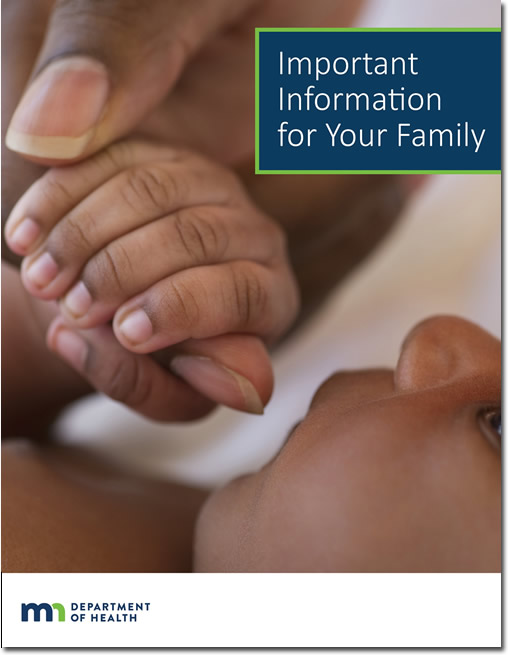Children and Youth with Special Health Needs (CYSHN)
Programs
- Birth Defects Monitoring and Analysis
- Early Hearing Detection and Intervention
- Follow Along Program
- Longitudinal Follow-up for Newborn Screening Conditions
Related Sites
Contact Info
Birth Defects Monitoring and Analysis
The Birth Defects Monitoring and Analysis program at the Minnesota Department of Health gathers data about selected birth defects diagnosed in the first year of life. An estimated 2,000 babies are born in Minnesota each year with a birth defect.
- 2025 Birth Defects Awareness Month Proclamation
- Birth Conditions in Minnesota
- Birth Defects Information System
- CHSTRONG KIDS Survey
- IMPLICIT Grant Program
- National Birth Defects Prevention Network
- Preconception Health in Minnesota Grants
- Program Statutes
The Birth Defects program supports the mission of the department to protect, maintain, and improve the health of all Minnesotans by helping children thrive, grow, and be as healthy as possible. The primary goals of the program are to:
- Monitor trends of birth defects to detect emerging health concerns and identify affected populations
- Assure appropriate services are provided to affected families
- Prevent birth defects through targeted education
- Educate physicians and the public regarding birth defects
- Stimulate research on risk factors, treatment, prevention, and the cure of birth defects
Even though 100,000 to 150,000 babies are born each year in the US with major birth defects, many of the actual causes of birth defects are not completely understood. Some types of birth defects are preventable. MDH focuses program activities on the prevention of birth defects.
There are many programs in our state that may benefit children with birth defects and their families. Knowledge of the occurrence of birth defects will help MDH link families to the services they need. Better tracking of when and where birth defects occur provides critical information that may help prevent birth defects in the future. This information will help all children in Minnesota have the best possible start in life.
State general funds support program activities, including coordination of services for those infants and families found to have special needs. Legislation passed in 2004 authorized the statewide expansion of birth defects monitoring and analysis activities. As part of this expansion, MDH is partnering with local and tribal public health agencies across Minnesota to connect children with birth defects to services in the communities where they live.
